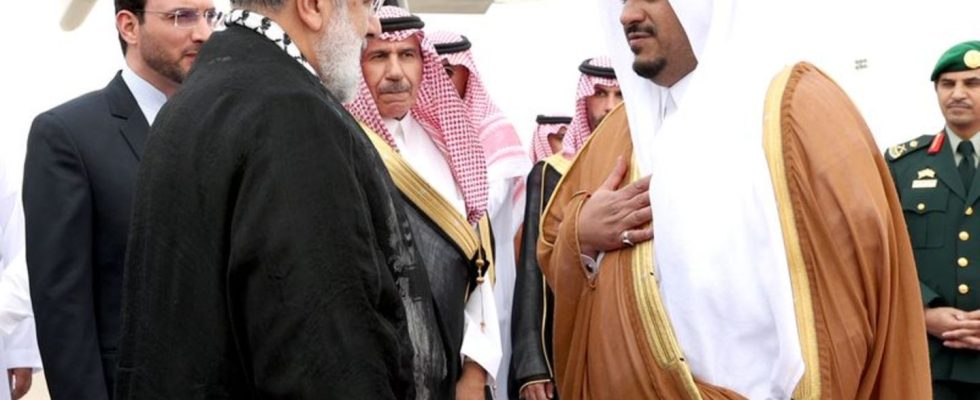War in the Middle East
Riyadh: Special summit calls for international peace conference
Ebrahim Raisi, President of Iran, is greeted by a Saudi official at the airport in Riyadh. photo
© Iranian Presidency/ZUMA Press Wire/dpa
The final declaration from Riyadh lists 31 points. It does not contain any binding decisions or concrete steps, such as a ceasefire in the Gaza war.
At a rare special summit, almost 60 Arab and other Islamic states called for an end to Israel’s “barbaric” attacks in the Gaza Strip and suggested an early peace conference. In a 31-point final declaration on Saturday, the participants called for: Riyadh calls for an end to arms exports to Israel and an International Criminal Court investigation against Israel for alleged war crimes.
The proposed conference must be held as quickly as possible in order to get a peace process going “on the basis of international law and international decisions.” The participants spoke of a “double standard in the application of international law”. This “difference seriously undermines the credibility of the countries that shield Israel from international law,” the statement said. Applying two different standards here would also lead to a “break between peoples and cultures”.
No concrete steps
However, the declaration does not contain any binding decisions or practical next steps, such as the path to a ceasefire or secure access for the delivery of aid supplies. However, the urgency was reflected in the rare format of the summit: an emergency meeting of the Arab League was originally planned for Saturday and a meeting of the Organization of Islamic Cooperation (OIC) on Sunday. Following agreements between the OIC and Saudi Arabia, which currently chairs the Arab League, both meetings were merged. The OIC includes 57 Muslim states.
The participants appeared united to the outside world. But there are said to have been disagreements beforehand: Egypt, Jordan and the Gulf states including Qatar are said to have rejected a proposal from Iraq, Lebanon and other countries to break off economic relations with Israel. This was reported by the Egyptian news site Mada Masr, citing government circles. The United Arab Emirates (UAE) and Bahrain also rejected a proposal to mention the right of Arab countries to “resist” in the text. The Emirates and Bahrain normalized their relations with Israel a few years ago.
Lots of celebrities
Prominent participants in Riyadh included Egypt’s President Abdel Fattah al-Sisi and Qatari Emir Tamim bin Hamad Al Thani, whose countries are both trying to mediate between Israel and Hamas, which rules the Gaza Strip. Al-Sisi once again made it clear that the “forced relocation of Palestinians” must be stopped. Out of fear of a mass exodus, Egypt and Jordan in particular are refusing to accept refugees from the Gaza Strip – also because of the fear that this could permanently drive them from their homeland.
Iranian President Ebrahim Raisi was among the invited guests. A novelty because it was his first visit to the kingdom since the resumption of diplomatic relations between Iran and Saudi Arabia. Raisi called on Islamic states to break off their political and economic ties with Israel. Syrian President Bashar al-Assad, whose country was recently readmitted to the league, described Israel’s attacks as “Zionist atrocities and massacres.” Assad himself had the Palestinian Yarmouk refugee camp in Damascus attacked and bombed during the civil war in Syria that has been going on since 2011.

